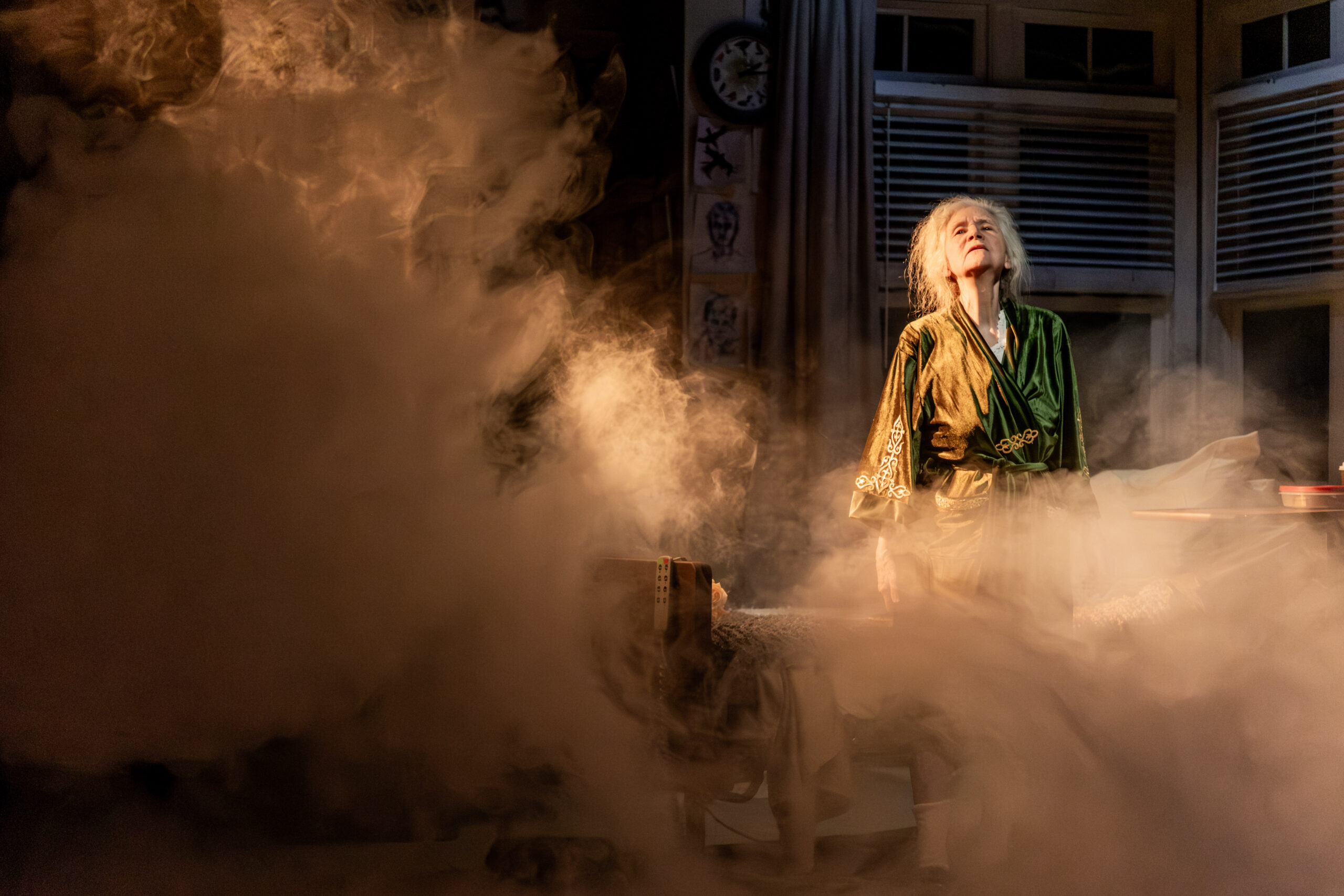
Jesse LaVercombe
“Be kind, but humble. Be rigorous in whatever ways make you feel jazzed.”
Jesse LaVercombe’s appearance in Sarah Ruhl’s Letters from Max, a ritual was a moving experience I will never forget. Staged by Necessary Angel, the production was the Canadian premiere of the play (based on the book) by the playwright and MacArthur Fellow Ruhl and her student Max Rivto. Directed by Alan Dilworth, the production featured Maev Beaty as Ruhl and LaVercombe as Rivto.
The play is an epistolary journey between Ruhl and Rivto. Their correspondence, through letters, cards, and email, was marked by humour, urgency, and humanity. The catch that hit close to home for me? Max Ritvo Ewing sarcoma, a rare form of pediatric cancer, had returned. LaVercombe’s performance of a young man cut down in the prime of his life by this disease rang clear, accurate and genuine.
LaVercombe returns to the stage once again this month. He will appear with actor/artist Ahmed Moneka in the award-winning hybrid theatre production King Gilgamesh (and the Man of the Wild) for a three-week engagement at Soulpepper Theatre in Toronto’s Distillery District. A co-production with Soulpepper and TRIA Theatre, Gilgamesh was an audience- and critic favourite. Moneka, LaVercombe and Seth Bockley wrote it. The production was nominated for five Dora Awards in 2023, winning in the category of Outstanding Music and Sound.
Seth Bockley, a New York City-based artist, directs the upcoming production. The production seamlessly merges the ancient Mesopotamian Epic of Gilgamesh with a modern story of an unlikely bromance set in Toronto.
Recently, I had an email conversation with LaVercombe to learn more about him and his part in Toronto’s theatre industry.
LaVercombe trained at Montréal’s National Theatre School and The Canadian Film Centre. Graduating from the school and emerging from the Film Centre, he loved acting and felt fortunate to be able to do it. But he wasn’t at all convinced that theatre was somehow vital to its audience.
That realization brought him to what Covid did to the theatre:
“Since Covid’s isolation, since phones have done a serious number on our attention spans, and since the fad of thinking that we cannot understand each other passed our differences took hold…Now I think theatre may be more vital than it’s been in a very long time, and I’m proud to be a part of it.”
Jesse isn’t reluctant to state that he has so many mentors from whom he still learns all the time. Coming out of the National Theatre School, Jesse’s most formative teacher was Adam Lazarus. They continued to work together on the short horror one-person play, Preacher Man, that he made with Adam at the theatre school. Adam then directed Jesse’s first one-act, one-person play, Love Me Forever, Billy H. Tender. Lazarus taught Jesse the primacy of the performer-audience relationship. According to Jesse, Lazarus’s humour is fearless, his heart is big, and he may quite possibly be insane, all of which is still inspirational to this day.
Does Jesse have words of advice for youthful actors who want to pursue this sometimes-tenuous industry?
“Be kind, but humble. Be rigorous in whatever ways make you feel jazzed.”
Is the theatre profession worth the effort and time for the hopeful performing arts graduates?
“If it’s [the profession] not really fun, at least some of the time, then no, I don’t think that it’s worth your effort and time.”
How does he feel about Gilgamesh opening soon?
“Pumped, bro. So many people didn’t get to see it last time, so we’re here to fix that.”
Jesse then shared a brief description of the Epic of Gilgamesh so that upcoming audiences will have some knowledge of the tale.
It is an ancient Mesopotamian poem recounting the adventures of Gilgamesh, the tyrant King of Uruk. Gilgamesh is challenged by Enkidu, a wild man sent by the Gods. Instead of remaining enemies, the two become close friends and embark on heroic quests such as slaying the forest guardian Humbaba and battling the divine Bull of Heaven. When Enkidu dies, Gilgamesh is devastated. His grief drives him to seek immortality, only to learn that no one escapes death. In the end, Gilgamesh returns to Uruk, transformed, realizing that true immortality lies in building a meaningful life and leaving a lasting legacy.
Moneka will play Gilgamesh, and LaVercombe will play Enkidu.
What was the play’s genesis?
Jesse met Ahmed at Driftwood Theatre (under Artistic Director Jeremy Smith). Moneka was an Artist in Residence for Driftwood, having recently arrived in Canada unexpectedly from Iraq. LaVercombe was a Writer in Residence working on (what he calls): “a three-act play about addiction and religion that was very ambitious and never really came close to making any sense at all.”
LaVercombe recalls with fondness how, at a cabin weekend with the company, his and Ahmed’s stoned eyes met across the fire while Ahmed sang and played the daf. Later, the two of them talked about working together. Ahmed wanted to create a theatre piece about Saint-Exupéry’s The Little Prince. When Ahmed first started talking about that story, he began referring to the Epic of Gilgamesh instead. That sounded pretty darn cool to Jesse. He then introduced Ahmed to Seth Bockley via Zoom. Bockley liked the vibe from these two guys. He told them to interview each other about some of the themes of the play – mainly death and sex – and then the three of them (now TRIA THEATRE) started meeting up in different cities in what Jesse calls: writing, creating, fucking around, getting to know each other, falling in love, etc.
Now, eight years later, here they are ready to open King Gilgamesh again.
What message does Jesse hope audiences will take away from seeing the production?
He quotes a line written by Seth that appears in the production:
“Eat good things – lamb and pomegranates – dance and make music, night and day. Feast and rejoice. Wear beautiful clothes, take long hot baths, cherish the children who hold your hand, and make love to your wife. That’s the best you can do. And honestly, it’s pretty good.”
This cheeky response makes me smile.
As we concluded our conversation, I asked, ‘What’s next for Jesse?’
He’s going to spend the winter living in a cabin in Michigan with his ‘kick-ass’ 90-year-old grandmother Judith Guest in his stage adaptation of her novel Ordinary People. Yes, that novel and film with Timothy Hutton, Mary Tyler Moore, Donald Sutherland and Judd Hirsch.
King Gilgamesh plays at Toronto’s Distillery District in the Michael Young Centre for the Performing Arts, 50 Tank House Lane. Presented by Soulpepper and TRIA THEATRE, performance dates are September 13 – October 5, 2025. For tickets: soulpepper.ca or call (416) 866-8666.




